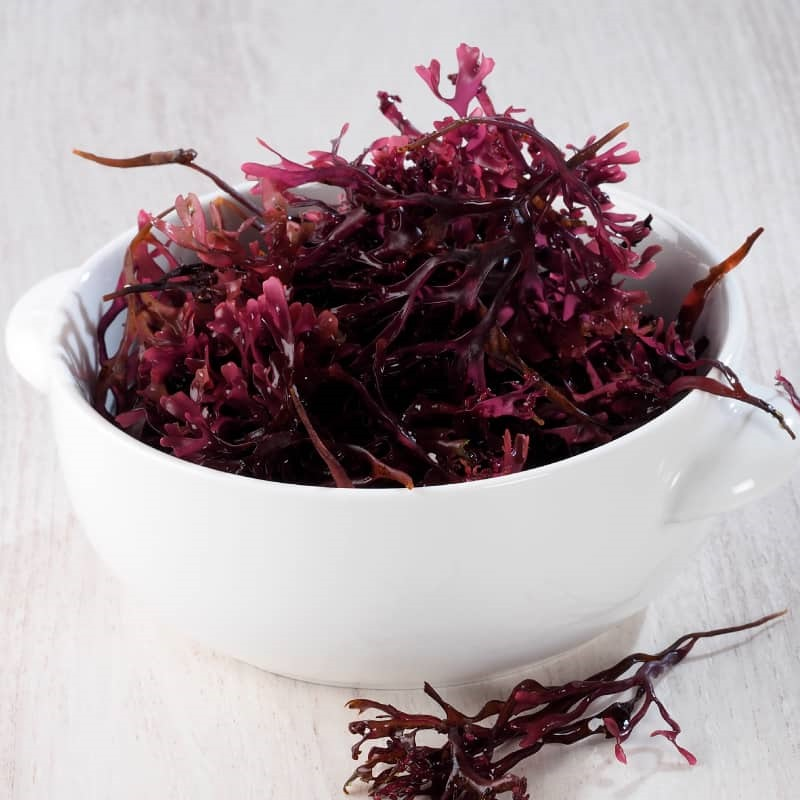
Benefits of Sea Moss - Dietary Guide and Tips
Share
In recent years, sea moss has surged in popularity as a health supplement, particularly among wellness enthusiasts. Among the various types of sea moss available, Chondrus crispus, commonly known as Irish moss, stands out for its remarkable nutritional profile and health benefits. Harvested primarily from the North Atlantic Ocean, this red algae has been a staple in traditional Irish and Caribbean diets for centuries.
Chondrus crispus, commonly known as Irish moss or carrageen moss, is a red algae that typically appears as a flat, leafy, and branching form. It has a distinctive color that ranges from deep purple to greenish-brown, depending on environmental conditions. The fronds can reach lengths of up to 30 cm (about 12 inches) and have a somewhat wrinkled or crinkly texture.
The structure is often described as resembling a small, bushy plant, with a thallus that is irregularly shaped and may have a smooth or slightly lobed edge. It often attaches itself to rocks in tidal zones, where it can withstand wave action. This algae is also known for its gelatinous consistency when soaked in water, which is why it's commonly used in food products and as a thickening agent.
Chondrus crispus, or Irish moss, is predominantly found along the rocky shores of the North Atlantic Ocean. It thrives in the intertidal zones, particularly in cooler waters, and can be found from the coasts of North America (like New England) to Europe, including Ireland and parts of Scandinavia. In these areas, it grows in dense patches, often exposed to saltwater and varying temperatures. The algae’s appearance remains consistent with its characteristic leafy and branching form, deep colors, and wrinkled texture, making it a notable part of the marine ecosystem in these northern waters.
In this blog, we will explore the scientifically-backed benefits of Chondrus crispus and why it deserves a place in your health regimen.

Nutritional Profile
Chondrus crispus is rich in essential nutrients, making it a powerhouse of health benefits. It contains:
- Vitamins: Sea moss is loaded with vitamins A, C, E, and K, alongside several B vitamins, which contribute to overall health and well-being.
- Minerals: This algae is particularly high in iodine, calcium, magnesium, potassium, and zinc, which are crucial for various bodily functions.
- Antioxidants: The presence of antioxidants helps combat oxidative stress and inflammation, promoting better health.
Health Benefits
1. Supports Thyroid Function
One of the most significant benefits of Chondrus crispus is its high iodine content, which is essential for healthy thyroid function. The thyroid gland regulates metabolism, energy levels, and overall hormonal balance. According to a study published in the Journal of Nutritional Science, iodine deficiency can lead to hypothyroidism, which can have widespread effects on health. By incorporating sea moss into your diet, you can help ensure adequate iodine intake.
2. Promotes Digestive Health
Chondrus crispus is rich in soluble fiber, which is beneficial for digestive health. This fiber acts as a prebiotic, supporting the growth of healthy gut bacteria. Research in the Journal of Medicinal Food has shown that a healthy gut microbiome can enhance digestion, boost immunity, and reduce the risk of various gastrointestinal diseases. Additionally, the mucilage present in sea moss can help soothe the digestive tract, alleviating issues such as irritation or inflammation.
3. Enhances Skin Health
The application of sea moss in skincare has gained traction due to its hydrating and anti-inflammatory properties. A review in the Journal of Cosmetic Dermatology highlights the benefits of marine-derived ingredients for skin health. Chondrus crispus can help soothe conditions like eczema and psoriasis, providing relief from itching and irritation. Its rich mineral content also supports skin elasticity and hydration, making it a popular ingredient in natural skincare products.
4. Boosts Immune Function
Sea moss is known to enhance immune function, thanks to its high antioxidant content and vitamins. Antioxidants help neutralize free radicals, reducing oxidative stress and inflammation in the body. A study in Frontiers in Immunology suggests that a diet rich in antioxidants can improve immune responses, helping the body fend off infections and diseases. Regular consumption of Chondrus crispus may contribute to a stronger immune system.
5. Aids in Weight Management
For those looking to manage their weight, Chondrus crispus may be beneficial due to its high fiber content, which promotes a feeling of fullness. This can help curb overeating and support weight loss efforts. Additionally, the minerals found in sea moss can help regulate metabolism, further aiding in weight management.
How to Incorporate Sea Moss into Your Diet
There are several ways to enjoy the benefits of Chondrus crispus:
- Gel Form: Sea moss gel can be added to smoothies, soups, and sauces for a nutrient boost.
- Powder: Sea moss powder can be mixed into drinks or used in baking.
- Capsules: For those who prefer a convenient option, sea moss supplements are available in capsule form.
Conclusion
Chondrus crispus, or sea moss, offers a plethora of health benefits supported by scientific research. From enhancing thyroid function and promoting digestive health to boosting immune function and improving skin health, this nutrient-dense sea vegetable is a valuable addition to any diet. As with any supplement, it is essential to consume it in moderation and consult with a healthcare provider, especially if you have existing health conditions or are pregnant.
Incorporating Chondrus crispus into your daily routine can be a simple yet effective way to enhance your overall health and well-being. Whether consumed in gel, powder, or capsule form, sea moss is a testament to the incredible nutritional potential of marine resources.
For those looking to incorporate Chondrus crispus into their health routine, Energy Sea Moss offers high-quality sea moss in gel form, making it easy to enjoy its numerous benefits. Our sea moss gels can be consumed directly or added to smoothies, soups, and other dishes for a nutritious boost. Additionally, our Energy Sea Moss Original is a versatile gel that can be used as a facial mask, providing hydration and nourishment to the skin. Regular application can help soothe irritation, improve texture, and enhance overall skin appearance. By choosing Energy Sea Moss, you can ensure you're getting a premium product that harnesses the natural goodness of sea moss from the North Atlantic Ocean.
